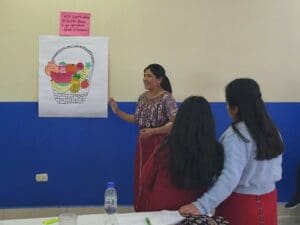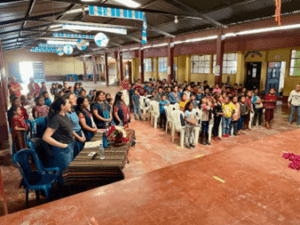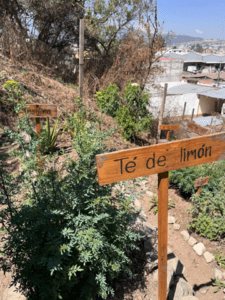Many of the children KIND serves come from Guatemala, and gender violence is often the reason they flee to the United States. KIND’s Gender and Migration Initiatives works with local partners to prevent this violence and promote gender equality, girls and women’s rights, and youth empowerment. Last month, the director of the initiative, Rachel Dotson, visited three long-time partners and witnessed the impact of their work, which includes peer support, community activities, and training.
Peer support is a key part of a program run by KIND partner ECAP (Equipo de Estudios Comunitarios y Acción Psicosocia or Team of Community Studies and Psychosocial Action) in Nebaj, a city in western Guatemala. Their community leadership initiative with adolescent girls includes leadership training and a series of workshops on gender-based violence prevention. Girls plan and implement community education activities ranging from spots on local radio to community theater to share what they have learned and take part in regional gatherings where they talk about their experiences with girls from other parts of Guatemala. Rachel witnessed the impact of their work during a reflection session that included participants from the most recent cohort and young women who completed the program in past years and continue to support their younger peers, nine girls ages 13 to 20. They reflected on what they have learned in the program and discussed how they plan to implement their learning.

Asociación Pop No’j, based in Huehuetenango (western Guatemala) supports the cultural identity and rights of the Maya people. An example of Pop No’j’s work is a teacher training program which focuses on gender equality and sexual abuse prevention. At the time of Rachel’s visit, they were holding an event at a local school led by teachers who had completed the program. About 75 children ages eight to 10 from Maya Mam communities talked about gender stereotypes and bodily autonomy, enjoyed song and dance icebreakers, and played a call and response game about gender equality. The children eagerly participated when the teachers asked for volunteers and laughed and played as they learned about gender equality.

Colectivo Vida Digna is an organization based in Quetzaltenango that works with youth and their families to promote knowledge and practices related to their Maya cultural identity. One of Vida Digna’s initiatives is a program through which adolescent girls learn about ancestral practices, including the use of medicinal plants as a source of support and healing for survivors of gender-based violence. Vida Digna’s educational medicinal plant garden (Huerta-Escuela) features a variety of plants that can be used for healing. Vida Digna’s team also shared the beautiful and complex weavings designed and produced by adolescent girls who participate in the organization’s economic strengthening project. Colectivo Vida Digna’s programming shows how ancestral knowledge can contribute to strengthening the cultural identity of Maya women and girls and preventing gender-based violence.

